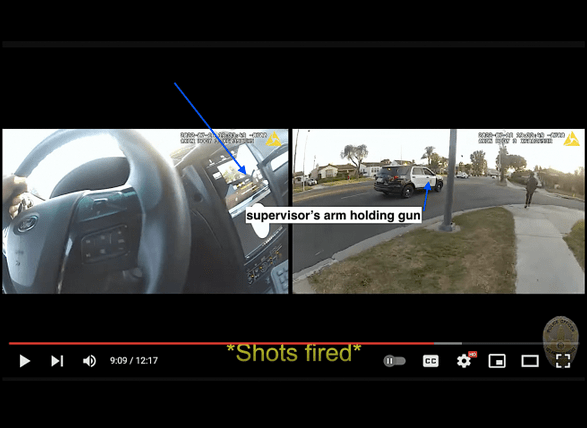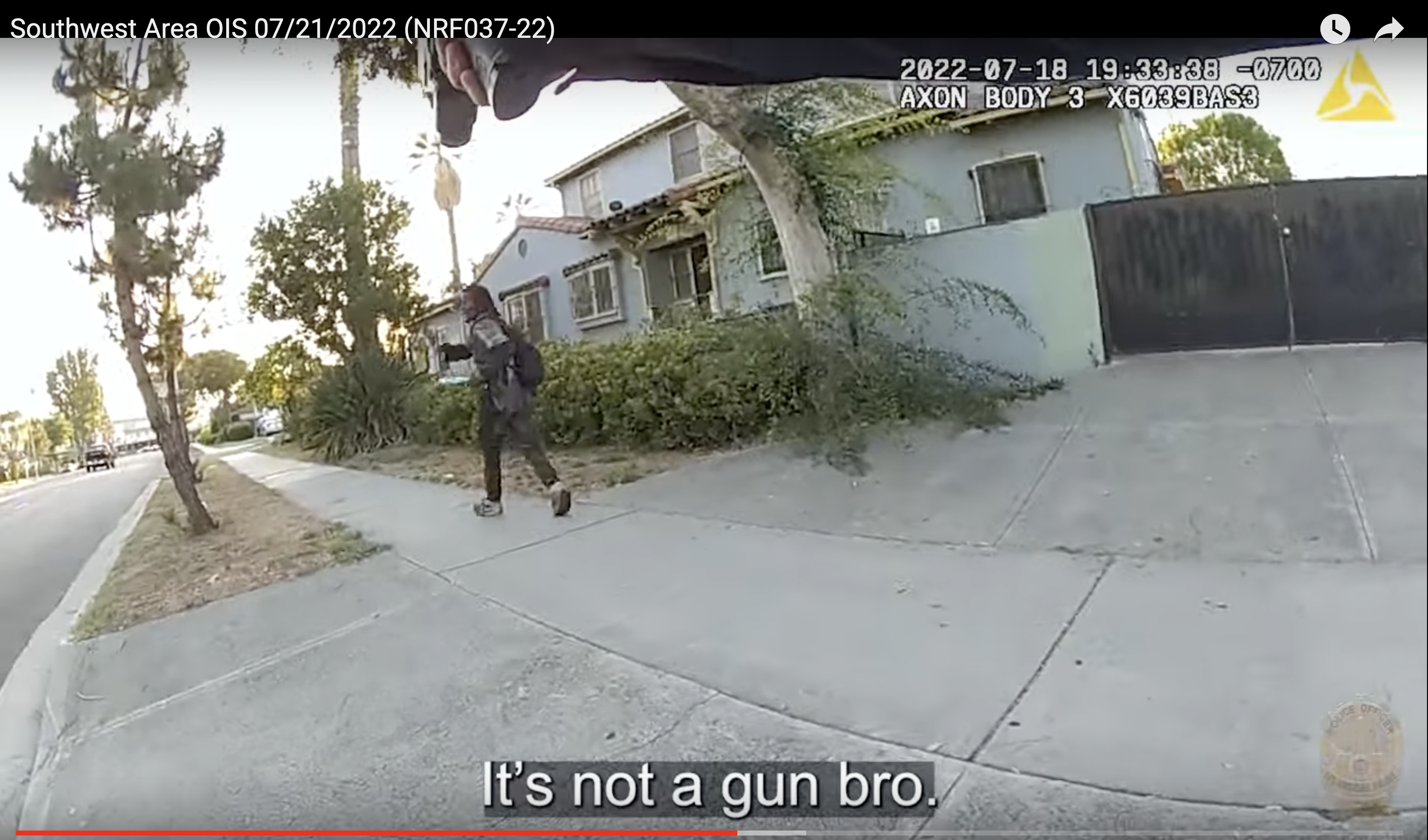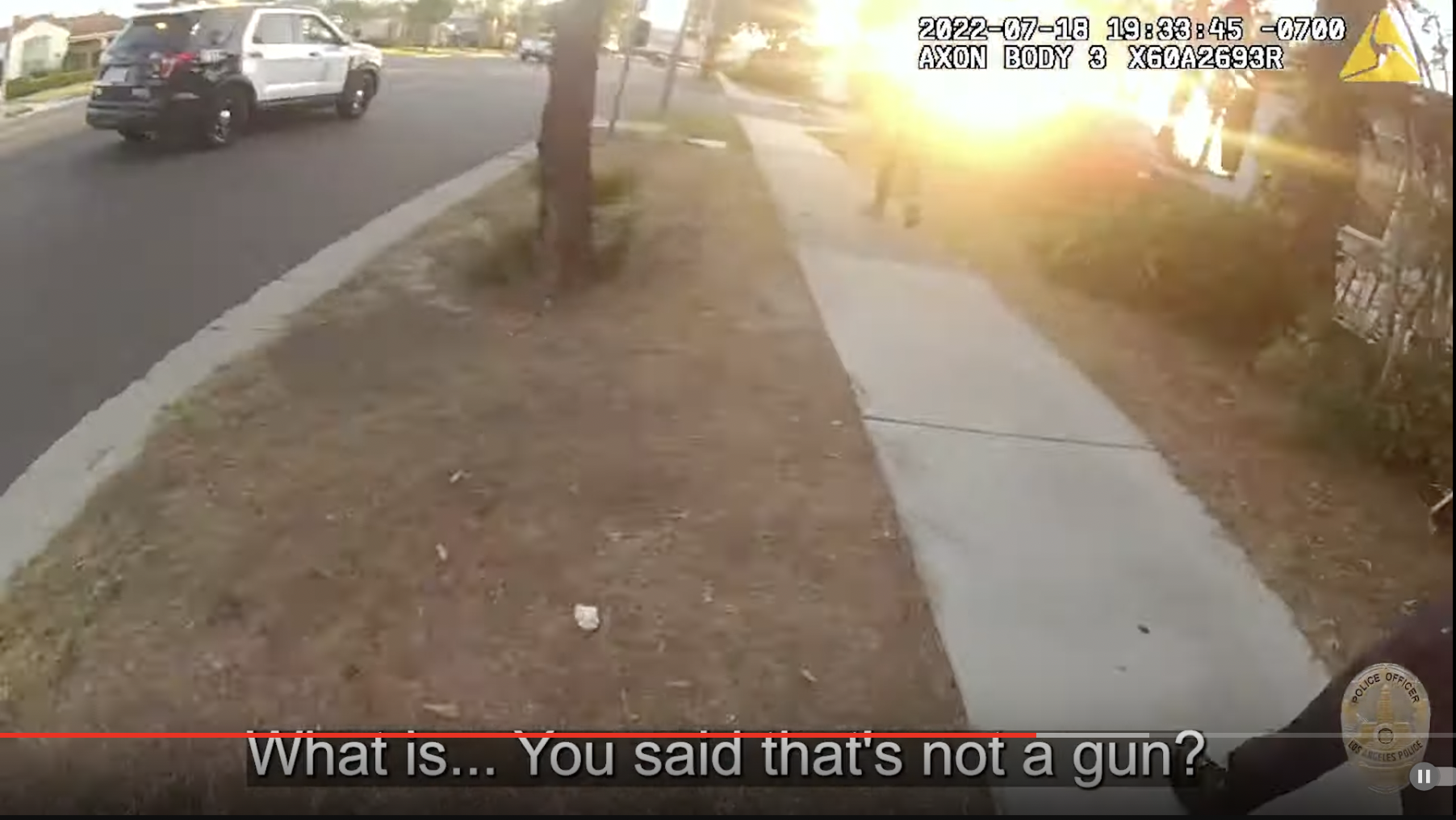Despite having been advised by his partner officer that 39-year-old Jermaine Petit was not carrying a gun, officer Daryl Glover Jr. raised his arms and fired at least one shot at Petit's back anyways.
But why?
A close watch of LAPD's critical incident briefing video for the July 18 Leimert Park shooting sheds some deeply troubling light on what happened.
In the footage, a harried Petit is seen walking away from two officers who have their weapons pointed at him. The officers have responded to 911 calls about a combative unhoused man with a gun. They are clearly concerned that the black object in his right hand is the weapon in question.
Then the first officer gets a good look at it.
"It's not a gun, bro," he exhales, lowering his weapon.
His relief is palpable.
It turns out Petit was carrying a black metal latch actuator (below).
A car part.
It takes Daryl Glover Jr., the partner officer, a second to register what the first officer is saying.
But he lowers his weapon and asks his partner for clarification.
Glover doesn't sound completely convinced, but he follows his partner's lead and together they jog behind Petit along the sidewalk.
They haven't put away their guns, but no longer have them trained on Petit, as can be seen in a screengrab from a neighbor's surveillance camera, below.
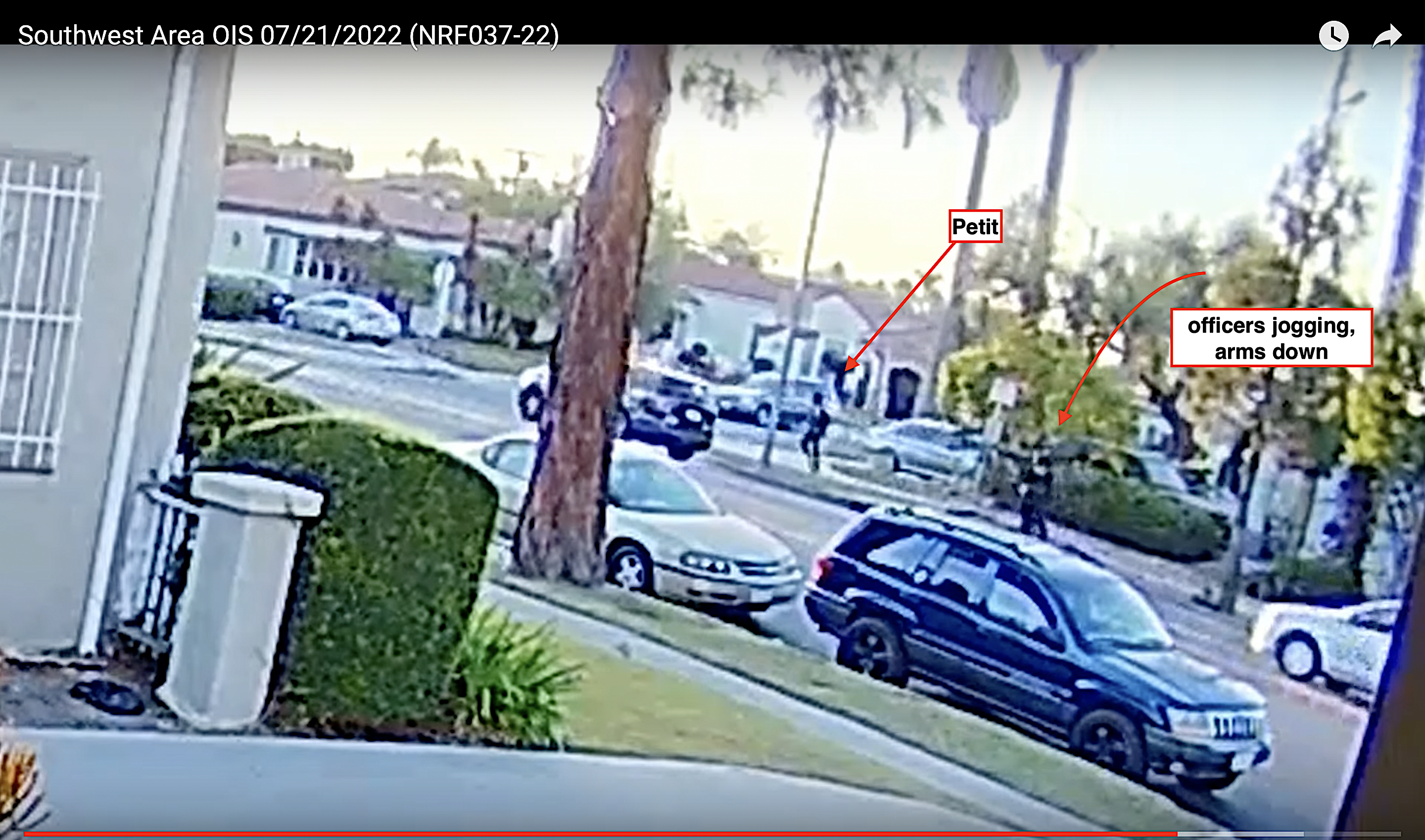
Though still wary of Petit, they seem to recognize that both the urgency and the danger are diminished, meaning they could now de-escalate the encounter and detain him.
They don’t get very far in that regard.
As Petit continues to walk away from the officers, Sergeant Brett Hayhoe's vehicle can be seen swooping in alongside him. A close inspection of the footage from inside the vehicle shows that Hayhoe had his gun trained on Petit for most of that time.
The reflection of Hayhoe's arm and gun in the console is shocking - LAPD policy explicitly prohibits firing from moving vehicles, except under exigent circumstances.
These were not exigent circumstances.
Petit posed no imminent threat here.
But Hayhoe was too preoccupied with trying to steer while aiming a gun out the window to notice: he does not communicate with his fellow officers, he does not appear to take note of Glover and his partner’s lowered weapons and more relaxed stances, and he does not appear to communicate with Petit (beyond yelling commands through the window).
Petit has no doubt seen Hayhoe’s weapon pointing at his chest, which may be why he pauses and turns to look straight at Hayhoe.
It appears that he also exchanges words with Hayhoe, but, contrary to LAPD's claims, Petit does not point anything in Hayhoe's direction and he never makes a threatening gesture of any kind (below).
Then Petit turns back to the business of getting away from officers and picks up his pace.
So does the partner officer.
He jogs ahead of Glover (below) and yells for Petit to drop the object.
Petit is almost to the intersection; he appears determined to get across it.
Then he looks to his left again.
Shots suddenly ring out from Hayhoe's vehicle.
Petit ducks but his legs appear to buckle.
Glover takes the lead from his superior officer, raises his weapon, and squeezes at least one shot off at Petit’s back.
Sergeant Hayhoe sparked contagious fire from an officer that knew Petit did not have a gun.
____________
Contagious fire is unfortunately not a new problem for LAPD.
Officers killed 22-year-old Margarito "Junior" López, an intellectually disabled youth who had been holding a knife to his own throat, with contagious fire just last December.
The lack of coordination with which LAPD responded to the crisis call created such a cacophony on scene that two of the officers failed to hear the standby warning given prior to the firing of a 40mm "less lethal" projectile. Startled when the less lethal gun went off, they both immediately opened fire with lethal rounds, killing López where he stood.
Rather than acknowledge what had occurred, however, LAPD claimed López had triggered the shooting by "advanc[ing] toward the officers" in a threatening manner. The critical incident briefing was carefully edited to support the department's version of events. It did not include footage from either the officer who had fired the less-lethal round or the one who had given the warning. LAPD also opted not to include the clearly audible "Forty, stand by!" warning in its transcription to better bury the error.
The department has returned to that same playbook in the Petit case.
In their very first statements to press about the shooting, LAPD reported Petit had been armed. Then, under intense probing by LAPD chronicler and critic William Gude/@FilmthePoliceLA on the scene that same night, they refused to say what Petit had been armed with. 911 calls had come in regarding a man with a gun, LAPD Sergeant Bruce Borihanh explained. But in response to the question of whether a gun had been found at the scene, Borihanh would only say they had recovered an unspecified weapon (below).
MLK & Degnan, Leimert Park:
— Film The Police LA (@FilmThePoliceLA) July 19, 2022
LAPD shot a Black man in the back three times. They refuse to say if he had a gun. pic.twitter.com/t8KunxaUM3
LAPD abruptly backtracked on that claim the next morning. Chief Michel Moore told the Police Commission that Petit had been carrying a “black metal latch actuator” and had refused to respond to commands, including when a "uniformed supervisor" had arrived on the scene.
But Moore also offered new information underscoring the threat Petit allegedly posed: Petit had been absentee booked on two outstanding felony warrants: one for Assault with a Deadly Weapon and another for Resisting an Executive Officer. [See the chief's full briefing here].
Over the next two weeks, LAPD continued to erect more scaffolding around the suggestion that Petit was dangerous.
On July 25, they updated the official statement on the shooting with a partial transcript from a 911 caller who said Petit had threatened him with a gun. They also added two images of Petit - one where he was walking away from officers and another where he was turned toward Hayhoe - to suggest he was making threatening gestures at the officers with the car part. The intention appears to have been to show how potentially dangerous he was, but Petit only looks hassled and like he wants nothing to do with police.
At a contentious town hall three days later, after first lambasting media for saying Petit was "unarmed," Captain Rudy Lopez explained how the 911 call had led officers to believe Petit was armed and violent. He was sharing this information, Lopez said, so participants could grasp “the facts of what transpired – what the officers knew" and what was "in the[ir] minds" when they approached Petit. Deputy Chief Gerald Woodyard then ran with that narrative, saying that, after seeing the body cam footage and hearing the 911 call, what stood out as "important" to him was how shaken up the 911 caller had sounded at having had what he thought was a gun pointed at him.
When asked to clarify whether LAPD was now claiming Petit was objectively armed, Lopez began pontificating on what the 911 call might have made him imagine the actuator to be, had he been the one to confront Petit.
“It was not a gun itself, no…” he admitted. “It resembled a gun. It was a hard metal object. I’m gonna give my own opinion on it – if I’d saw that [Petit] was carrying it and I had information from a witness that he was pointing that at me, I would have believed it was a gun, but it was a nonfunctioning firearm.” [Although LAPD would later attempt to distance themselves from the "nonfunctioning firearm" statement, it appears that Lopez simply mixed up his adjectives. It turns out LAPD had charged Petit with two counts of Brandishing a Replica Firearm on July 20 - something that was not made public until the release of the briefing video.]
It's not hard to see where LAPD is headed with all this.
Claiming officers "believed" Petit was armed allows the department to suggest "officer fear" played a role in decision-making.
That, in turn, makes it easier for the department to justify an action - like the commission of what amounts to a drive-by - that might otherwise cause public outcry and/or be considered egregiously out-of-policy.
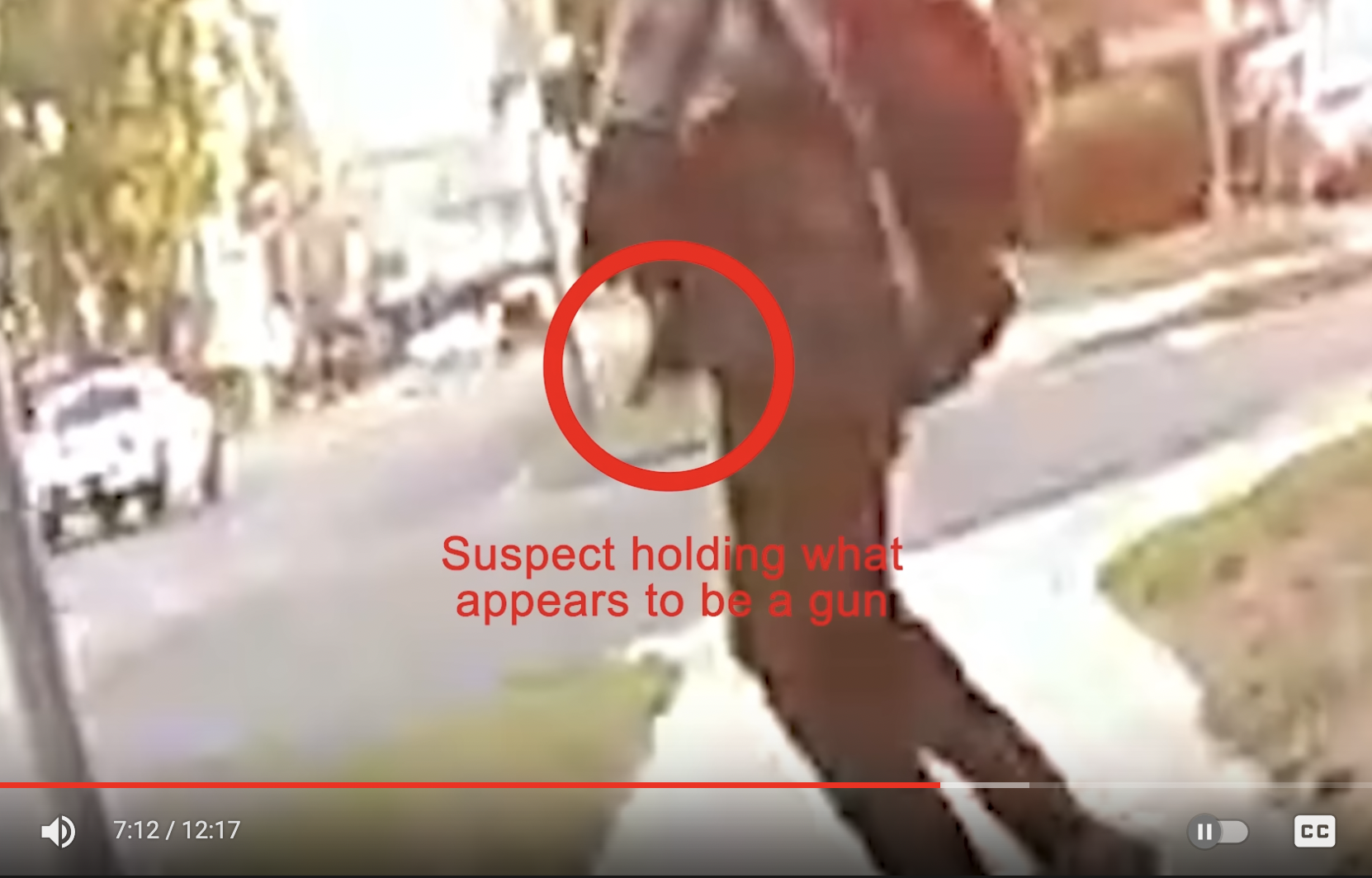
Not one to leave things to chance, LAPD opted not to spell out the fact that Hayhoe had fired at Petit from inside the patrol vehicle in the briefing video.
Instead, in her narration of events, Captain Kelly Muñiz tells viewers that, like the two partner officers, the sergeant "also believ[ed] Petit was armed with a handgun" and that the shooting had occurred after a noncompliant Petit had "turned toward the sergeant and pointed a black metallic object at him."
The omission appears to have worked. Both the local and national NBC outlets failed to realize Hayhoe had fired at Petit from his vehicle. So did the Daily Beast. As a result, they don't question who fired first. They do not mention contagious fire. And they do not raise questions about just how much effort the department has put in to shielding Hayhoe from scrutiny.
__________
But Hayhoe's aggressive Wild West behavior deserves serious scrutiny.
His unnecessary escalation of the incident meant that Petit, a former Air Force medic who suffers from PTSD and schizophrenia and who has already had several traumatic altercations with law enforcement, was left to bleed in the street for several minutes while Hayhoe decided when it was safe to move in to assist him.
In the footage, Hayhoe appears to be in no rush to do so.
After the shooting, he calmly exits his vehicle, gun still in hand, and immediately assumes a shooting stance. He tells the other officers he sees the "gun," which is lying near Petit's head.
[Notably, LAPD cut some of the audio about the "gun" out of the briefing video. Hear that two-second drop here or here; audio is recorded directly from the briefing video at the moment seen below. It is unclear what was cut, but beginning at 19:33:58 (the time stamp found in the upper right corner), Hayhoe's body cam (at left) goes in and out of sync with Glover's as they speak about the gun. See this spot in the LAPD's video here.]
Hayhoe then tells the partner officers and the others arriving on scene to take cover.
While precious minutes tick away, officers huddle up at his direction and slowly approach Petit in formation. One even carries a riot shield (below).
As they move closer to Petit, it becomes increasingly obvious (via Hayhoe's own body cam footage) that the object on the ground is not a gun.
Yet Hayhoe is undeterred, telling officers to "secure the gun" after rolling the injured Petit over and handcuffing him.
An officer obliges by kicking the actuator out of the way.
It clatters into view, looking like the metal car part it is.
Though Hayhoe's body cam is cut shortly afterwards, in bystander footage, he can be seen eagerly moving in behind the group to get a look at the actuator. When he does, he appears to hang his head before walking away from the group altogether, possibly realizing the gravity of what has just occurred. [Find that footage here; warning, it is graphic.]
The scene is incredibly difficult to watch.
Petit is bleeding and audibly in pain, the supervisor that shot him is fully aware Petit was unarmed, yet there is absolutely no urgency to assist Petit in any way. In fact, it is likely that Hayhoe's insistence in treating Petit this way is the reason the call for an ambulance was delayed by three full minutes (the time it took to move in on Petit and kick the actuator out of the way).
Another eleven minutes elapse before a fire truck arrives.
In the interim, neighbors on the scene voice their distress. They do not understand why officers seem more concerned with searching Petit's belongings than offering him medical assistance.
For his part, Hayhoe continues to mill aimlessly around the scene. While the other two officers involved in the incident stand to the side, Hayhoe asks where the "item" is, then moseys over to the patrol vehicle to get a closer look at the actuator.
Then he moves over to observe what is going on with Petit and asks "Travis" if he is any good at doing chest compressions.
Before being taken from the scene by an investigator, he approaches Petit one last time. He leans down to get what appears to be his first good look at the man he shot - the man he couldn't be bothered to engage before opening fire on him. "Yeah, bro, stay with us," he says. "Stay with us."
_________
Jermaine Petit thankfully survived this encounter, though he was seriously injured. See the LAPD's briefing video below. Find me on twitter: @sahrasulaiman. See our previous coverage of Petit's shooting here. See my evolving thread on this case here.
